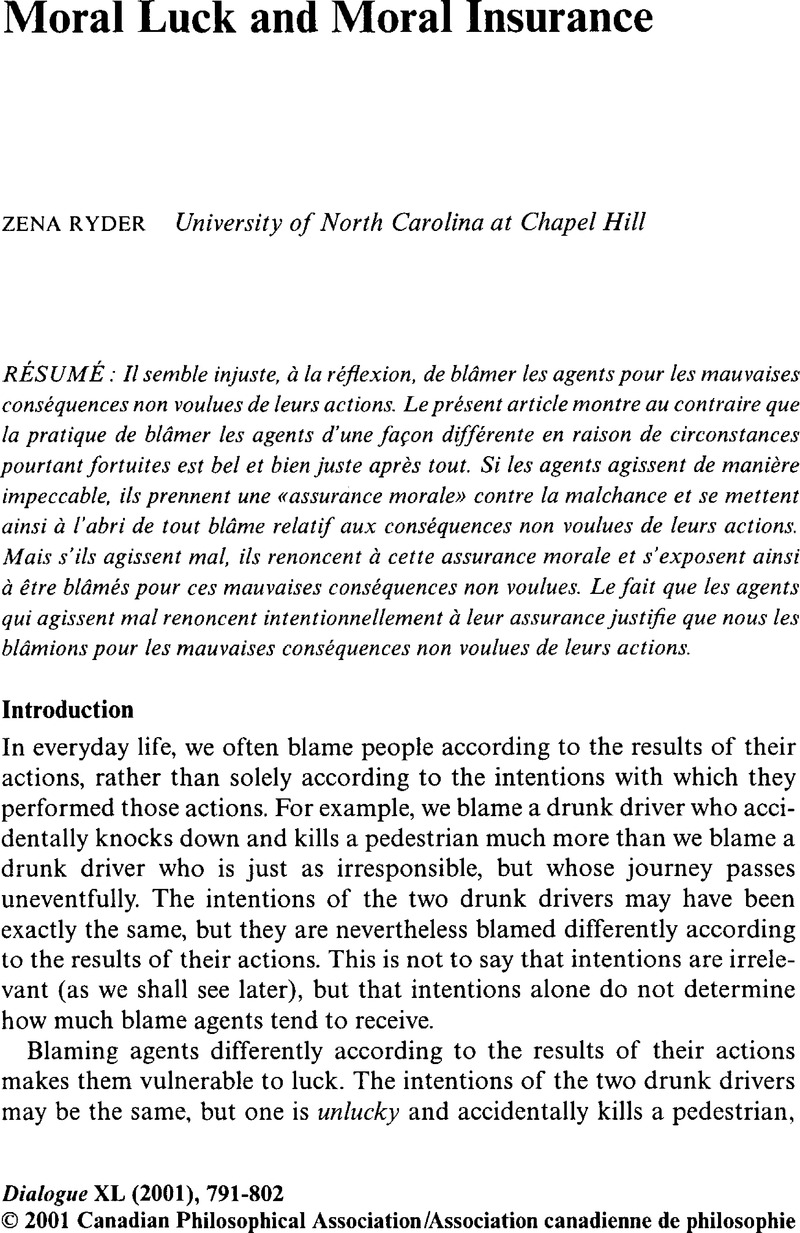No CrossRef data available.
Published online by Cambridge University Press: 13 April 2010

1 “Ordinary moral practice” is a very intuitive notion. It is simply the collection of judgements we (all human beings or, perhaps, inhabitants of the Western world) actually make in everyday life. Like the English language, it develops slowly and has variations within it, and people disagree about which are the correct judgements in difficult cases. But there is much agreement in both cases. Killing babies for fun is wrong; “He walk quick” is not good English; “Shu waqune ogkwok” is not English at all.
2 A number of kinds of moral luck have been distinguished. Thomas Nagel in “Moral Luck” distinguishes four different kinds. In this paper I will be concentrating on the problem of what Nagel calls “resultant luck” which is luck in how the results of one's actions turn out. When I write of “the problem of moral luck,” this should be taken to refer to the problem of resultant moral luck. See Nagel, Thomas, “Moral Luck,” in his Mortal Questions (New York: Cambridge University Press, 1979).Google Scholar
3 As in informal spoken English, I will often use “they,” “them,” “their,” etc., instead of “he,” etc. Although it is not “proper” grammar, I find this far more natural than substituting “she,” etc. I will stick with “he,” etc. when to do otherwise would be unclear or stylistically clumsy.
4 If one fails to act on a good will, then one is acting on a will that is, to some degree, bad. Acting on a bad will is the same as failing to act on a good will (so long as one is acting at all). So, “good” in this context is synonymous with “permissible”; “bad” is synonymous with “impermissible.” Acting on a bad will is also roughly synonymous with acting with bad intentions, and. Mutatis mutandis for “good will” and “good intentions.”
5 I am suggesting that a Kantian intuition is at work. I do not wish to defend any particular interpretation of Kant's own views.
6 Kant, Immanuel, Groundwork of Metaphysics of Morals, translated by Paton, H. J. (New York: Harper Torchbooks, 1964), p. 84.Google Scholar
7 In practice, since we do not have access to people's intentions, we would not always have the ability to blame someone as much as they might deserve. But we would at least have to radically change our practice because if agentsought to be blamed only according to their intentions, and if we do not know what these are, then probably we should at least refrain from blaming them according to the consequences of their actions. (Kant himself thought that there might never have been a morally good action, since for all we know there might never have been an action performed with genuinely good intentions. Although it is sometimes difficult, even impossible, to know whether someone acted with good or bad intentions, Kant's view that there might never have existed a well-intentioned action is an extreme sceptical position, and one I shall put aside for the purposes of this paper.)
8 A different, but related, kind of case is where two people both intend to do something bad, but only one of them succeeds. In such cases, if we follow the first suggestion in the text, we should blame both agents equally, in which case we would have to learn to blame failed or potential murderers as much as successful murderers. Admittedly, blaming equally in this kind of case is not so counter-intuitive. But our practice of blaming differently also fits with the insurance metaphor that I explain later in the text. Both agents give up their insurance when they act with bad intentions, and make themselves vulnerable to blame for the consequences of their actions. But one cannot be blamed for what does not happen. So the failed murderer cannot be blamed for a death. 9 Kant, Groundwork, p. 62.
10 If it were the case that the driver had been given great quantities of alcohol against his will—so much that he could no longer make a rational decision—he would not be blamed for his drunk driving, let alone for any unlucky consequences. He is not to blame because he did not act with any bad intentions. In the case where someone—without the intention to drive later—of their own accord drinks so much that later on when they consider driving, they are no longer able to make a rational decision, we blame them for deaths that they cause. This is because they are responsible for their own future behaviour when drinking so much not to be able to make a rational decision later. They intentionally gave up their insurance when they drank so much as to lose their rational capabilities that could put them and others into a dangerous situation.
11 The driver who has an animated conversation may be said not to have any bad intentions, and so should not be blamed at all. However, although ordinarily we might say that he does not have any bad intentions, he does—to a very small degree—behave badly. He intentionally behaves badly, although we would not describe him as having bad intentions. I think the difference in description is irrelevant and does not indicate a genuine, morally important distinction.
12 This is all on the assumption that there are no epistemic shortcomings. If we do blame differently from my description, then maybe that would be due to epistemic inadequacies.
13 I am grateful to one of the anonymous referees for Dialogue for raising this issue. The example that follows is theirs.
14 See Nagel, Mortal Questions, p. 28.
15 Thanks to Roger Crisp, Geoff Sayre McCord, Michael Ridge, the anonymous referees for Dialogue, and, especially, Dan Ryder.